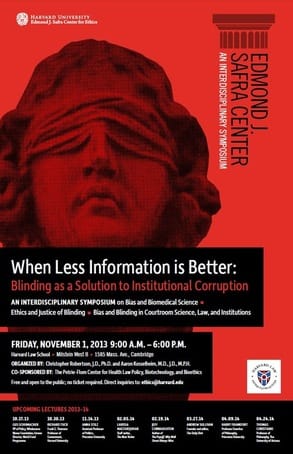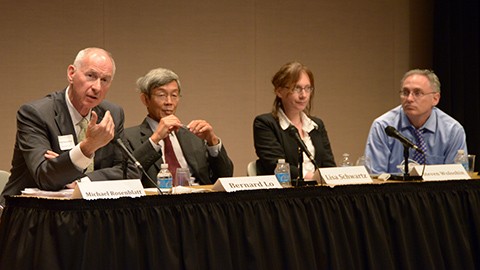Building a Biomedical Information Commons:
A Policy and Ethics Seminar
April 19, 2016 | Harvard Medical School
Access to large public genetic databases is essential to advancing the diagnosis and management of genetic diseases. The largest databases of genetic variants are currently held by proprietary companies, such as Myriad Genetics, who control access to the data and thereby increase the cost of developing new life-saving technologies. Public databases, such as ClinGen, are racing to catch up, but have been criticized as being unreliable, expensive and vulnerable to funding cuts that compromise their upkeep. In this seminar we will explore the pros and cons of these two approaches to managing genetic information.
A Policy and Ethics Seminar
April 19, 2016 | Harvard Medical School
Access to large public genetic databases is essential to advancing the diagnosis and management of genetic diseases. The largest databases of genetic variants are currently held by proprietary companies, such as Myriad Genetics, who control access to the data and thereby increase the cost of developing new life-saving technologies. Public databases, such as ClinGen, are racing to catch up, but have been criticized as being unreliable, expensive and vulnerable to funding cuts that compromise their upkeep. In this seminar we will explore the pros and cons of these two approaches to managing genetic information.
|
|
EXPERTS:
Robert C. Green, MD, MPH Director, G2P Research Program in Translational Genomics and Health Outcomes Brigham and Women's Hospital, Broad Institute, and Harvard Medical School Heidi L. Williams, PhD Assistant Professor in Economics Massachusetts Institute of Technology MODERATOR: Robert Cook-Deegan, MD Research Professor in the Sanford School of Public Policy Duke University |
What Evidence is Essential for New Medical Products?
Implications for Patients and Health Policy
Implications for Patients and Health Policy
When Less Information is Better:
Blinding as a Solution to Institutional Corruption
(Video available here, scroll to find lectures.)
Blinding as a Solution to Institutional Corruption
(Video available here, scroll to find lectures.)

Edmond J. Safra Center for Ethics
Harvard University | November 1-2, 2013
Co-sponsored with the Petrie-Flom Center for Health Law Policy, Biotechnology and Bioethics.
Harvard University | November 1-2, 2013
Co-sponsored with the Petrie-Flom Center for Health Law Policy, Biotechnology and Bioethics.
|
Program On Regulation, Therapeutics And Law (PORTAL)
Division of Pharmacoepidemiology and Pharmacoeconomics 1620 Tremont Street, Suite 3030 Boston, MA 02120 |



